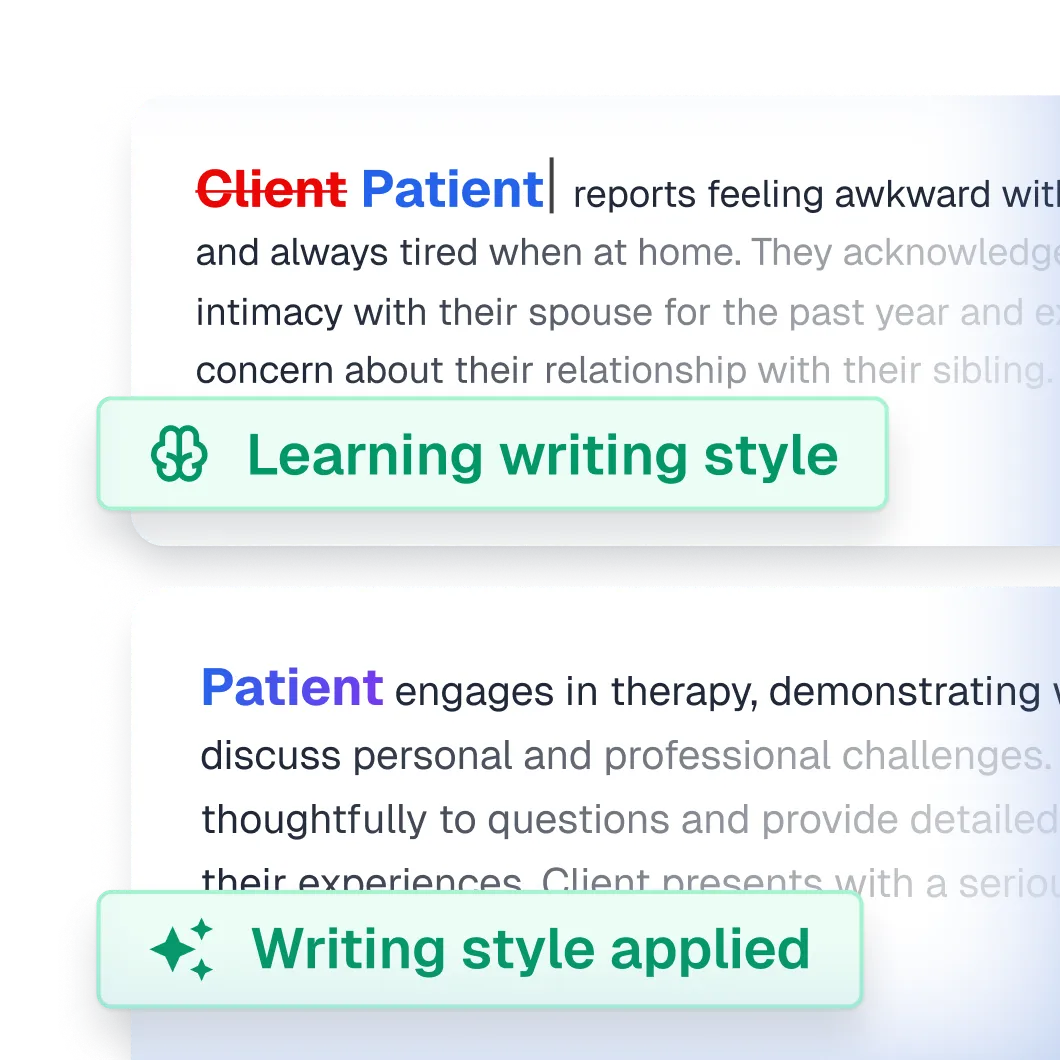How tools like Upheal can support ethical practice in social work

In recent years, demand for social work has been increasing. Sadly, our 21st-century world is seeing more mental and healthcare needs, poverty, inequality, and a lack of affordable housing.
The field of social work is a dynamic and impactful profession focused on empowering and changing the lives of individuals, communities, and society at large with a commitment to social justice.
In this blog, I’ll explore how AI can transform social work practice and how this innovative technology can help social workers deliver services more efficiently and ethically with tools like Upheal.
Firstly, how is AI transforming social work?
Before we get into how Upheal can help support ethical practice, it’s good to note that research already sees AI as being a supportive tool for social workers.
On a mezzo and macro level, it can help by conducting policy analysis, program evaluations, and community organizing through targeted, engaging, and culturally responsive messages that resonate with diverse audiences.
On an individual level, tools like ChatGPT can help with writing referral letters, generating educational material, writing treatment plans, documentation, grant writing, fundraising, and more.
Not to mention, AI behavioral health apps can also be used to support social work therapeutic interventions, by using evidence-based cognitive behavioral techniques, DBT, meditation breathing, yoga, and motivational interviewing. And, predictive AI analytics and algorithms can forecast services and help agencies determine how to best allocate resources.
Having support doing these tasks is a huge time saver for overstretched social workers.
Now let’s look at how a tool like Upheal can help social workers in their day-to-day work, before we consider how Upheal supports ethical practice and explore further ways in which social workers could use their training to advance ethical and responsible adoption of AI in practice.
4 ways Upheal is helpful in day-to-day practice
As a busy social worker, here’s how Upheal can help on a given weekday when you have about 12 million other things to do.
1. Assisting with writing progress notes
Upheal can help social workers generate and write progress notes for clients. This can save the social worker much-needed time and reduce the burden of writing case notes.
2. Creating evidence-based treatment plans
Upheal’s platform saves time by creating personalized, easily modifiable treatment plans. These include evidence-based practices such as SMART goals, progress evaluation, intervention recommendations, and outcome evaluation and can be adjusted to reflect the social worker’s expertise and client-specific needs.
3. Providing AI-powered analytics
Upheal’s platform has a session analytics tool for social workers to gain further insights into data points such as speech ratio, speech cadence, and even the client’s sentiment during client counseling sessions for additional evidence of a client’s state. In this way, Upheal can assist social workers in making better-informed decisions.
Streamlining scheduling
A built-in scheduling feature allows social workers to schedule follow-up sessions directly during client calls, with options for recurring sessions that streamline future planning. It’s also possible to sync with your Google calendar and better organize your scheduling needs.
By integrating AI-driven tools like Upheal, social workers can spend less time on administrative tasks which allows more focus on client care. However, all of this demands considerations from an ethical perspective.
How I use my skills and background to advance ethical adoption
While I recognize that AI has incredible potential to support school social work tasks to enhance the delivery of services, its use must be guided by the ethics and core values of our profession. Social workers are uniquely trained to critically assess technology tools but to also ensure that use is aligned with cultural competency and client-centered practices. Here is how my social work training and experience inform my ethical approach to using AI technology:
1. Reviewing AI-generated progress notes for accuracy and bias
A key responsibility of social workers when writing client progress notes is to ensure they are accurate, maintain confidentiality to the greatest extent possible, and are written from a strengths-based perspective. When AI tools are used to generate progress notes, it is important to carefully review all the content that is written for not only accuracy but also to ensure that is it free from bias or language that can reinforce stereotyping or stigmatization. You also want to ensure that minimal information is shared to protect confidentiality as much as possible while maintaining standards for medical necessity in the progress note.
2. Making treatment plans a collaborative process
While AI can assist with making treatment plans, they cannot be imposed on clients. My approach centers on collaboration and client determination. After reviewing an AI-generated treatment plan I would engage the client to discuss the proposed goals and interventions and gather their input. I would adjust and edit the treatment plan as needed. This process then ensures this is client-centered and aligned with ethical social work practices.
3. Viewing data from a human-centered perspective
AI tools can provide insights through data analytics but interpreting this data requires a human-centered approach. My training as a social worker enables me to analyze and review client data while considering the complex interplay of individual, social, cultural, and environmental contexts. Approaching data with this mindset ensures insights are used to empower clients, rather than pathologize.
4. Commitment to ethical practice and continuous learning
My commitment to the core ethical values of social work—dignity and worth of the person and human relationships—guides my use of AI tools. Upholding the dignity and worth of individuals through AI involves ensuring client autonomy, informed consent, and collaboration throughout the decision-making process. I prioritize maintaining human relationships by utilizing AI as a supportive tool rather than a replacement for direct clinical interactions with clients this ensures that AI tools enhance rather than replace the human-centered services I provide. It is also crucial for social workers to continually develop their knowledge and skills in using AI tools. As these technologies advance, staying informed and adaptable is essential for their effective and responsible application in our practice
How Upheal supports ethical use
When it comes to ethical considerations, Upheal is an example of an AI tool that supports social work ethics and responsible practice, and can also be used to improve the efficiency of clinical services. Upheal is a HIPAA, PHIPA, and PIPEDA-compliant platform that ensures the confidentiality of Protected Health Information.
Data confidentiality
Personal information is always de-identified. This means it's not stored in its original form but is replaced with a random identifier. In addition, you can also create anonymous clients on Upheal and no personal identifiers need to be stored at all.
Flexibility and control
Unlike other platforms, you can simply pause the AI or create notes without it. It’s your and your client’s choice. Pause the AI to avoid capturing sensitive moments or use the dictation or text-to-note functionalities, which don’t require the temporary capture of a session at all.
Rigorous security practices
It goes without saying, but use a powerful unique password for your Upheal account. Don’t share it with other services and avoid using the same password for multiple accounts. Avoid networks susceptible to attack such as public wifi when using the platform.
Gold-standard regulations
Upheal is HIPAA, PHIPA, PIPEDA, and GDPR compliant with SOC 2 Type II attestation. It follows standards to ensure the confidentiality, integrity, and availability of Protected Health Information (PHI). In addition, it has received the “gold” standard of data protection and goes through regular internal security controls to ensure security, confidentiality, availability, processing integrity, and privacy. Whether you choose Upheal or not, make sure your AI tool has a similar level of regulations in place. If you export data from Upheal, make sure you store it safely and HIPAA-compliantly. Only use trusted services that are compliant with data protection regulations, like Upheal.
In-built client consent policies
Upheal has proper consent policies and supports this by ensuring that you cannot use Upheal without marking that you have collected consent either privately or by using the platform’s default consent collection documents (these are sent out automatically for you if you enable this feature).
Strong privacy protocols
The team at Upheal can only access the PHI of a client when it’s necessary to resolve a technical issue reported by you, the mental health professional for specific troubleshooting reasons.
Upheal warns against sharing access
Upheal provides strategies and tips to ensure added privacy and security when using the platform, such as not sharing access to your Upheal account with anyone else, even trusted colleagues. Upheal accounts are designed to be individual, and sharing access can lead to a breach of client confidentiality.
Transparency about processes
Being able to tell your clients about how Upheal works is a part of having a trust-filled ethical practice. Upheal is informative and open about the way the AI platform works. You’ll find more on the web under Privacy and can read through additional privacy and security questions, as well as compliance and legal information, which you can easily share with your clients.
Expanding your social work practice with Upheal
Social work is a field that is dedicated to empowering and changing the lives of clients and communities through support and advocacy. With tools like Upheal, social workers can integrate AI technology into their practice responsibly to enhance efficiency and improve client care without compromising ethical standards.
Upheal exemplifies how AI tools can be integrated into social work practice while upholding ethical responsibility with data security, client consent, and confidentiality. With innovative tools like Upheal, social workers can confidently adapt to the demands of the future and deepen their impact.












